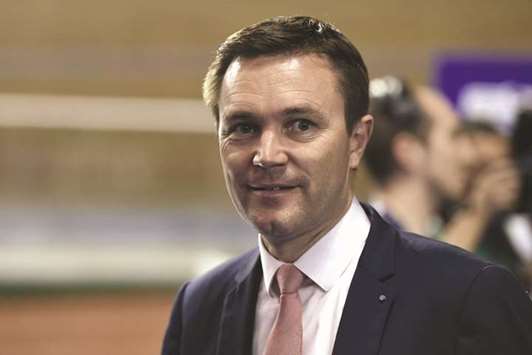The 44-year-old beat incumbent Brian Cookson by a landslide 37 votes to eight at the world cycling governing body’s Congress in Bergen, Norway.
And having vowed in his election campaign to fight against corruption, doping and technological fraud, Lappartient said he would not be getting complacent now that he is president.
“We have to be stronger because I don’t want tomorrow to have new Armstrong affair - it would be a disaster for our sport,” said Lappartient.
“To lose credibility takes five minutes, to regain it takes 20 years – we have to be careful about it.”
He vowed to ensure independence and transparency in drug testing and “continue the fight against technological fraud”, although he said the UCI would “need to implement new systems”.
He also admitted that the “economic model of our sport is not very strong”, pointing to the team sponsors being local or national companies rather than global names.
Briton Cookson, 66, had beaten Ireland’s Pat McQuaid in a bitter and farcical election four years ago but in defeat became the first UCI president to fail to earn a second term.
He came to power in 2013 following years of doping scandals and the fall-out from Lance Armstrong’s admission of cheating throughout his career, which saw him stripped of his record seven Tour de France wins.
“The UCI I leave behind is unrecognisable from the organisation I took over in 2013 and I depart with my head held high,” said Cookson.
“Someone needed to stand up and take on the previous regime, who had dragged cycling into the gutter.”
In the build-up to yesterday’s election, Cookson accused his predecessor McQuaid of working against him behind the scenes. McQuaid was frank in his support for Lappartient, telling Cyclingnews website that the UCI “needs a change” and describing Cookson as a “fraud”.
The election vote was a surprise for many who had expected a close-run battle.
But in earning 37 votes, Lappartient, the incumbent European Cycling Federation president and until March the French federation president too, said it was “not a photo-finish, the message of the membership was clear: they want to have new leadership”.
Lappartient, who said he was “deeply honoured” by his election, becomes the 11th president of the UCI since its creation in 1900.
He was French federation president from 2009 until March and has been European federation president since 2013, a position he now leaves to take on his new role.
The 44-year-old is also mayor of a small town in Brittany.
A crackdown on hidden motors is a top priority for Lappartient to restore credibility to the scandal-ridden sport. Lappartient Cookson, who was elected as UCI president on a similar promise in 2013, at the governing body’s congress during this week’s road Cycling world championships.
But Cookson failed to convince UCI delegates that the organisation was effectively fighting so-called mechanical doping after Femke Van den Driessche, was caught with a hidden motor in 2016. The Belgian rider said it was not her bike.
“I will be focused on guaranteeing the credibility of the results, especially on technological fraud,” Lappartient told Reuters.
The UCI implemented a system under which stewards check bikes with iPads adapted with magnets to detect hidden motors, but a joint report earlier this month suggested the method, also criticised by several riders and team managers, was ineffective.
“We were not professional enough on this subject and I will bring some new ideas to check the bikes and to be stronger on this subject. I don’t want the UCI to be seen as weak in the fight against technological fraud,” Lappartient said.
The 44-year-old Frenchman added he wants a method used by Tour de France organisers to be used more widely.

